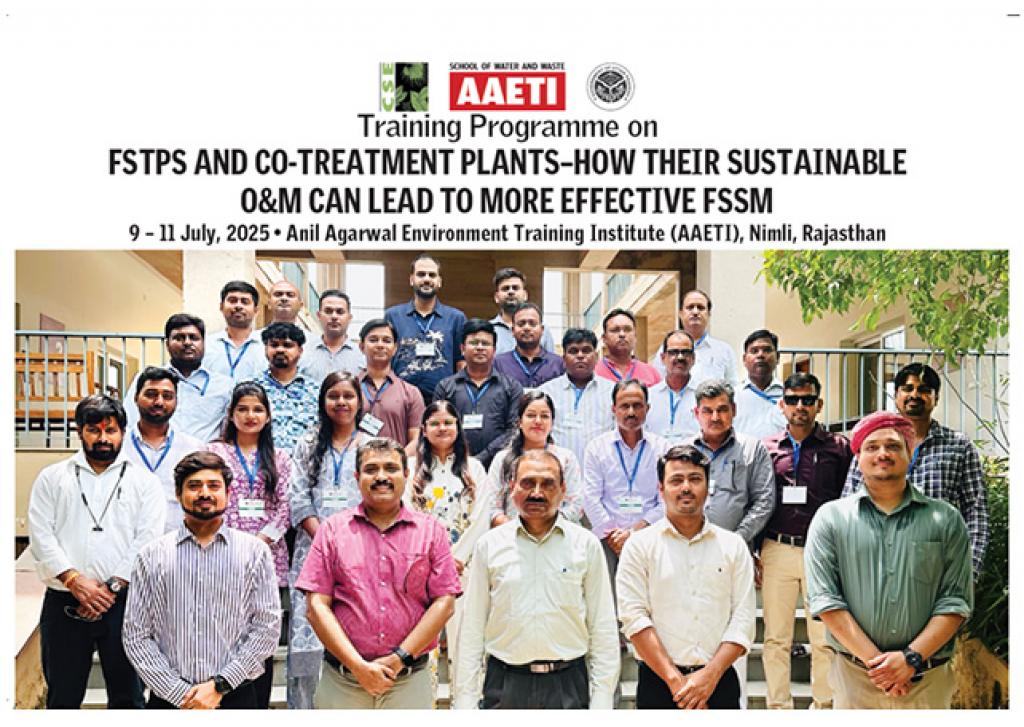Residential Training Programme: FSTPs and Co-treatment Plants
This event is complete
India has made significant strides in improving urban sanitation, particularly through construction and operationalisation of Faecal Sludge Treatment Plants (FSTPs) and co-treatment facilities across its cities and towns. While the initial focus has been on infrastructure creation, the real challenge lies in ensuring these systems perform efficiently and sustainably over time.
Effective operations and maintenance (O&M) is the backbone of any sanitation infrastructure. Without it, treatment plants risk falling into disrepair, underperformance, or even complete failure — leading to wasted investments, environmental pollution, public health hazards, and loss of public trust. Poorly operated plants often result in untreated or partially treated waste being released into the environment, undermining the very goals they were built to achieve.
On the other hand, well-executed, routine, and preventive O&M ensures the longevity of assets, maximizes treatment performance, improves resource recovery, reduces operational costs, and safeguards public health and the environment. It also strengthens accountability and enables Urban Local Bodies (ULBs) and plant operators to deliver consistent, high-quality sanitation services.
Recognising this, Centre for Science and Environment (CSE) is organising a three-days residential training programme to equip officials, practitioners, and professionals across India with the necessary technical knowledge, management skills, and best practices to operate and maintain FSTPs and co-treatment plants the right way — ensuring infrastructure remains functional, resilient, and impactful for years to come. The training will cover the range of treatment chains/technologies implemented across India.
The programme will blend technical learning with real-world case studies, hands-on exercises, lab exposure, and peer exchange to create a practical, action-oriented learning experience.
OBJECTIVES
- Build technical knowledge on structure and functioning of FSTPs and co-treatment plants
- Understand standard operating procedures (SOPs) and safety measures related to plant operation
- Strengthen capacity for routine and preventive maintenance
- Enhance planning, budgeting, documentation, and monitoring practices for sustainable O&M
- Clarify roles and responsibilities of plant staff and ULBs for effective service delivery
TRAINING METHODOLOGY
This training offers a rich, hands-on learning experience combining:
- Expert-led technical sessions
- Video documentaries
- Case studies
- Practical group exercises
- Lab exposure
- On-site simulations
TRAINING COORDINATOR
HARSH YADAVA
Programme Officer
Water Programme, CSE
Email: harsh.yadava@cseindia.org
Phone: +91 8709638775
TRAINING DIRECTOR
SUBRATA CHAKRABORTY
Director, Water Programme
CSE email: subrata.chakraborty@cseindia.org
| List of Participants | ||
| Download pdf | ||
| Proceedings for the training | ||
| Download pdf | ||
| Attendance sheet | ||
| Download pdf | ||
| Feedback based on google forms report | ||
| Download pdf | ||
| Feedback video | ||
| Flyer | ||
 |
||
| Download pdf | ||

Share this article